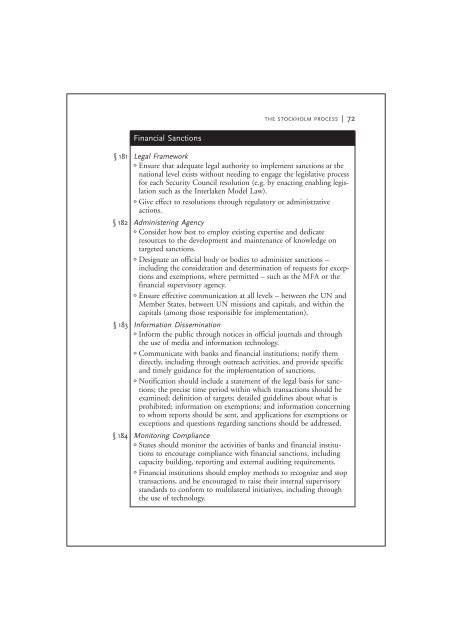Making Targeted Sanctions Effective - Small Arms Survey
Making Targeted Sanctions Effective - Small Arms Survey
Making Targeted Sanctions Effective - Small Arms Survey
Create successful ePaper yourself
Turn your PDF publications into a flip-book with our unique Google optimized e-Paper software.
THE STOCKHOLM PROCESS | 72<br />
Financial <strong>Sanctions</strong><br />
§ 181<br />
§ 182<br />
§ 183<br />
§ 184<br />
Legal Framework<br />
° Ensure that adequate legal authority to implement sanctions at the<br />
national level exists without needing to engage the legislative process<br />
for each Security Council resolution (e.g. by enacting enabling legislation<br />
such as the Interlaken Model Law).<br />
° Give effect to resolutions through regulatory or administrative<br />
actions.<br />
Administering Agency<br />
° Consider how best to employ existing expertise and dedicate<br />
resources to the development and maintenance of knowledge on<br />
targeted sanctions.<br />
° Designate an official body or bodies to administer sanctions –<br />
including the consideration and determination of requests for exceptions<br />
and exemptions, where permitted – such as the MFA or the<br />
financial supervisory agency.<br />
° Ensure effective communication at all levels – between the UN and<br />
Member States, between UN missions and capitals, and within the<br />
capitals (among those responsible for implementation).<br />
Information Dissemination<br />
° Inform the public through notices in official journals and through<br />
the use of media and information technology.<br />
° Communicate with banks and financial institutions; notify them<br />
directly, including through outreach activities, and provide specific<br />
and timely guidance for the implementation of sanctions.<br />
° Notification should include a statement of the legal basis for sanctions;<br />
the precise time period within which transactions should be<br />
examined; definition of targets; detailed guidelines about what is<br />
prohibited; information on exemptions; and information concerning<br />
to whom reports should be sent, and applications for exemptions or<br />
exceptions and questions regarding sanctions should be addressed.<br />
Monitoring Compliance<br />
° States should monitor the activities of banks and financial institutions<br />
to encourage compliance with financial sanctions, including<br />
capacity building, reporting and external auditing requirements.<br />
° Financial institutions should employ methods to recognize and stop<br />
transactions, and be encouraged to raise their internal supervisory<br />
standards to conform to multilateral initiatives, including through<br />
the use of technology.
















